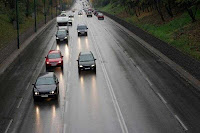Water on the roads
isn’t good for anybody, and it really causes havoc with the ability to stop
your car. Inevitably, you’re going to
drive through a puddle, and that’s likely to splash water up into your brakes. A light tap a few times afterwards will
actually help dry the brake pads to help you stop better the next time.
Got your cruise
control on? Turn it off! Cruise control works on how fast it “thinks”
the car is going. If you happen to hydroplane with cruise control on, those
wheels will start spinning crazy-fast and you could have some big troubles once
the tires make contact with the road
again.
Lastly, if you hear
some temporary squealing in your brakes after it rains that could be a couple
of things. Sometimes a little harmless
rust forms on the surface rotors and makes noise until it gets knocked way, or
trapped water in little grooves heats up and actually whistles like a tea pot
as it steams away. If the squealing
lasts more than a min ute or two, you
might have something completely different going on and you may need to bring
your car in for a complete check.
Beyond that, all the
other safe driving rules apply: Don’t
drive through standing water, slow down during rain, and bring an
umbrella. You don’t want your hair all
mussed up, do you?




